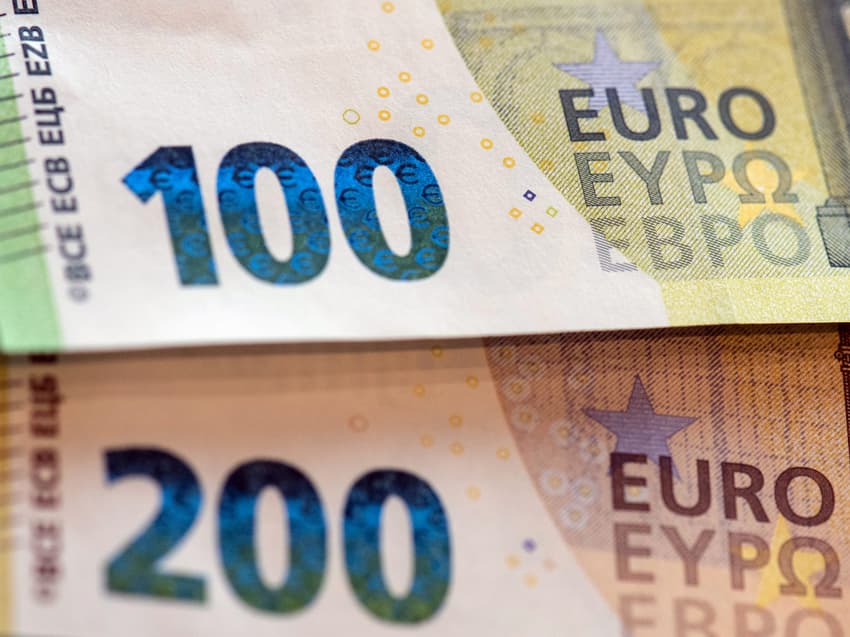Reader question: Why haven’t I received my €300 payment yet in Germany?

Many working people in Germany will have received their energy relief payment by now. But if you haven’t got yours yet, there’s no need to worry, here are some reasons why that could be and what you can do.
The €300 payment – known as the Energiepreispauschale or EPP – is one of the German coalition government’s relief measures intended to help people with rising energy costs. It goes out to everyone who lives and works in Germany, including those in part-time and temporary employment, trainees and students in paid internships as well as freelancers.
READ ALSO: What you need to know about Germany’s €300 energy relief payout
Those who have already received the payment as part of their September pay packet will have had an item on their pay slip marked as sonstiger Bezug ("other remuneration") or "E" for Einmalbezug ("one-time payment“).
The EPP is subject to payroll tax, so only those who earn below the basic tax-free allowance (that means they don’t earn enough to pay any tax) will benefit from the full amount.
According to the Ministry of Finance, employees will receive on average €193 from the €300 allowance.
However, if the EPP didn‘t appear on your pay slip in September, here are a couple of reasons why that could be:
You have a mini-job
Mini-jobbers need to make clear to their employers that their mini-job is their main means of income, as often a mini-job is carried out alongside another job. If you haven’t received your €300 payment yet it’s best to discuss this with your employer and to confirm that it is your main job in writing.

A waiter carries a tray with used glasses and empty bottles. Photo: picture alliance/dpa | Jonas Walzberg
Your employer is not required to make the payment
There are some cases where the flat-rate energy allowance is not paid out by the employer at all. The Federal Ministry of Finance mentions the following exceptions, for example: if the employer is not required to file income tax returns, or the employee is employed on a short-term basis or is a temporary worker in agriculture and forestry.
In these cases, you have to file an income tax return for 2022 and claim the EPP there.
The payment may come later
The Ministry of Finance says that, if an employer misses the payment "for organisational or accounting reasons," for example if you started your job in August and the payroll department missed you out, then the payment can be made later.
At the latest, however, it should come when the employer sends the Lohnsteuerbescheinigung (wage tax statement) – which is usually sent in December. In this case, too, it's advisable to clarify with your employer or the payroll department why you haven't received the payment yet.
You work for a small company
Sometimes employers are not obliged to pay out the energy flat rate in September, but can still do so in October. This is the case if the employer submits its payroll tax returns to the tax office on a quarterly rather than monthly. Smaller employers, for example, who pay less than €5,000 in advance wage tax per year, only have to submit the advance wage tax payment once a quarter. This is not due until October 10th, so the employees concerned will not receive the €300 lump sum until October.
What other support will people get from the German government?
On Tuesday, Germany’s 16 state leaders are meeting with Chancellor Olaf Scholz to discuss which measures the €200 billion package announced last week should include.
READ ALSO: Germany to thrash out details of €200 billion energy support package
It’s expected that a Gaspreisdeckel - or a cap on the price of gas households would pay this winter - will soon come into force when the details are worked out, while plans for a cheap follow-up to the popular €9 ticket will also be presented later this month.
Benefit payment recipients will receive a one-off top-up to their existing benefit payments to pay for the higher cost of heating and pensioners will receive a €300 payment on December 1st. They do not have to apply for this, it’ll simply be added to the payments they receive from their pension insurance funds.
READ ALSO: KEY POINTS: Everything Germany is doing to help relieve rising energy costs
A €200 one-off payment is also planned for students, although each federal state may end up paying the amount slightly differently in a process that’s still being defined.
From next year, parents will see an increase in the amount of child benefit (Kindergeld) they receive, up to €237 per month, per child, up to and including the third child.
Comments
See Also
The €300 payment – known as the Energiepreispauschale or EPP – is one of the German coalition government’s relief measures intended to help people with rising energy costs. It goes out to everyone who lives and works in Germany, including those in part-time and temporary employment, trainees and students in paid internships as well as freelancers.
READ ALSO: What you need to know about Germany’s €300 energy relief payout
Those who have already received the payment as part of their September pay packet will have had an item on their pay slip marked as sonstiger Bezug ("other remuneration") or "E" for Einmalbezug ("one-time payment“).
The EPP is subject to payroll tax, so only those who earn below the basic tax-free allowance (that means they don’t earn enough to pay any tax) will benefit from the full amount.
According to the Ministry of Finance, employees will receive on average €193 from the €300 allowance.
However, if the EPP didn‘t appear on your pay slip in September, here are a couple of reasons why that could be:
You have a mini-job
Mini-jobbers need to make clear to their employers that their mini-job is their main means of income, as often a mini-job is carried out alongside another job. If you haven’t received your €300 payment yet it’s best to discuss this with your employer and to confirm that it is your main job in writing.

Your employer is not required to make the payment
There are some cases where the flat-rate energy allowance is not paid out by the employer at all. The Federal Ministry of Finance mentions the following exceptions, for example: if the employer is not required to file income tax returns, or the employee is employed on a short-term basis or is a temporary worker in agriculture and forestry.
In these cases, you have to file an income tax return for 2022 and claim the EPP there.
The payment may come later
The Ministry of Finance says that, if an employer misses the payment "for organisational or accounting reasons," for example if you started your job in August and the payroll department missed you out, then the payment can be made later.
At the latest, however, it should come when the employer sends the Lohnsteuerbescheinigung (wage tax statement) – which is usually sent in December. In this case, too, it's advisable to clarify with your employer or the payroll department why you haven't received the payment yet.
You work for a small company
Sometimes employers are not obliged to pay out the energy flat rate in September, but can still do so in October. This is the case if the employer submits its payroll tax returns to the tax office on a quarterly rather than monthly. Smaller employers, for example, who pay less than €5,000 in advance wage tax per year, only have to submit the advance wage tax payment once a quarter. This is not due until October 10th, so the employees concerned will not receive the €300 lump sum until October.
What other support will people get from the German government?
On Tuesday, Germany’s 16 state leaders are meeting with Chancellor Olaf Scholz to discuss which measures the €200 billion package announced last week should include.
READ ALSO: Germany to thrash out details of €200 billion energy support package
It’s expected that a Gaspreisdeckel - or a cap on the price of gas households would pay this winter - will soon come into force when the details are worked out, while plans for a cheap follow-up to the popular €9 ticket will also be presented later this month.
Benefit payment recipients will receive a one-off top-up to their existing benefit payments to pay for the higher cost of heating and pensioners will receive a €300 payment on December 1st. They do not have to apply for this, it’ll simply be added to the payments they receive from their pension insurance funds.
READ ALSO: KEY POINTS: Everything Germany is doing to help relieve rising energy costs
A €200 one-off payment is also planned for students, although each federal state may end up paying the amount slightly differently in a process that’s still being defined.
From next year, parents will see an increase in the amount of child benefit (Kindergeld) they receive, up to €237 per month, per child, up to and including the third child.
Join the conversation in our comments section below. Share your own views and experience and if you have a question or suggestion for our journalists then email us at [email protected].
Please keep comments civil, constructive and on topic – and make sure to read our terms of use before getting involved.
Please log in here to leave a comment.